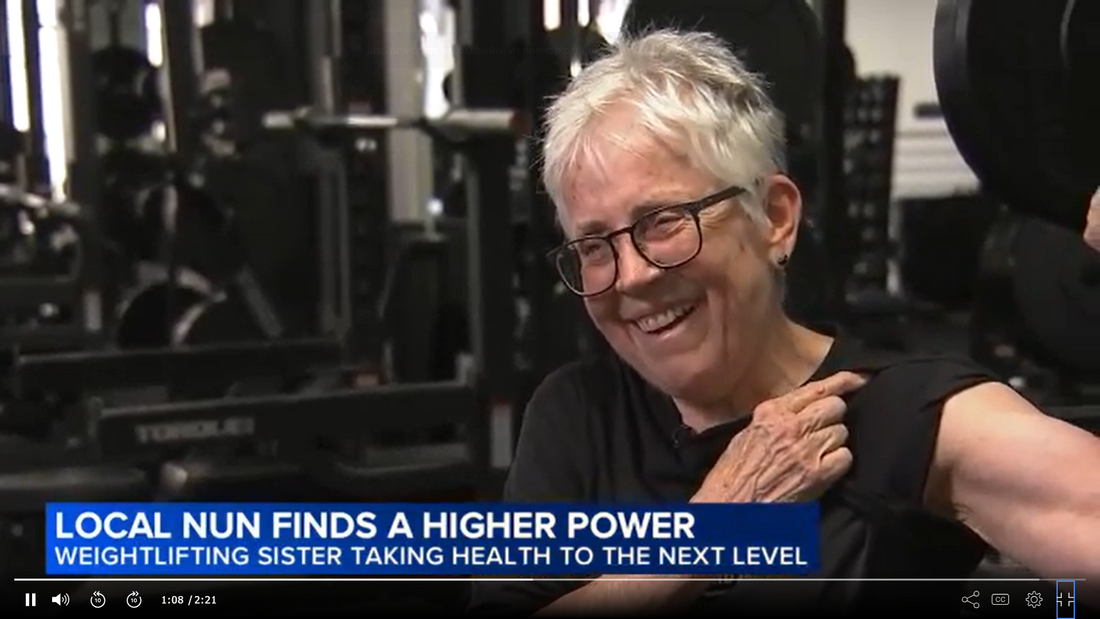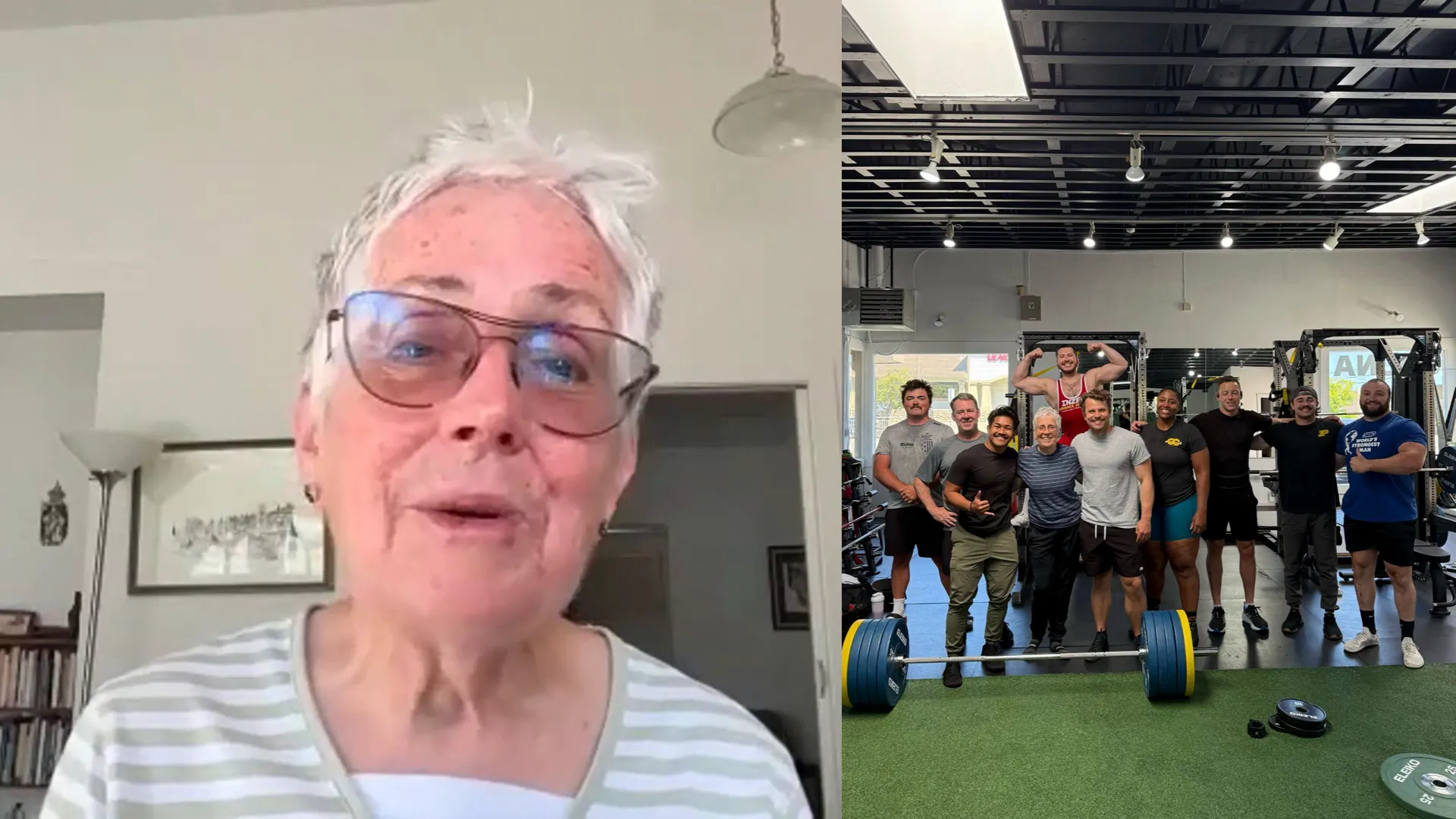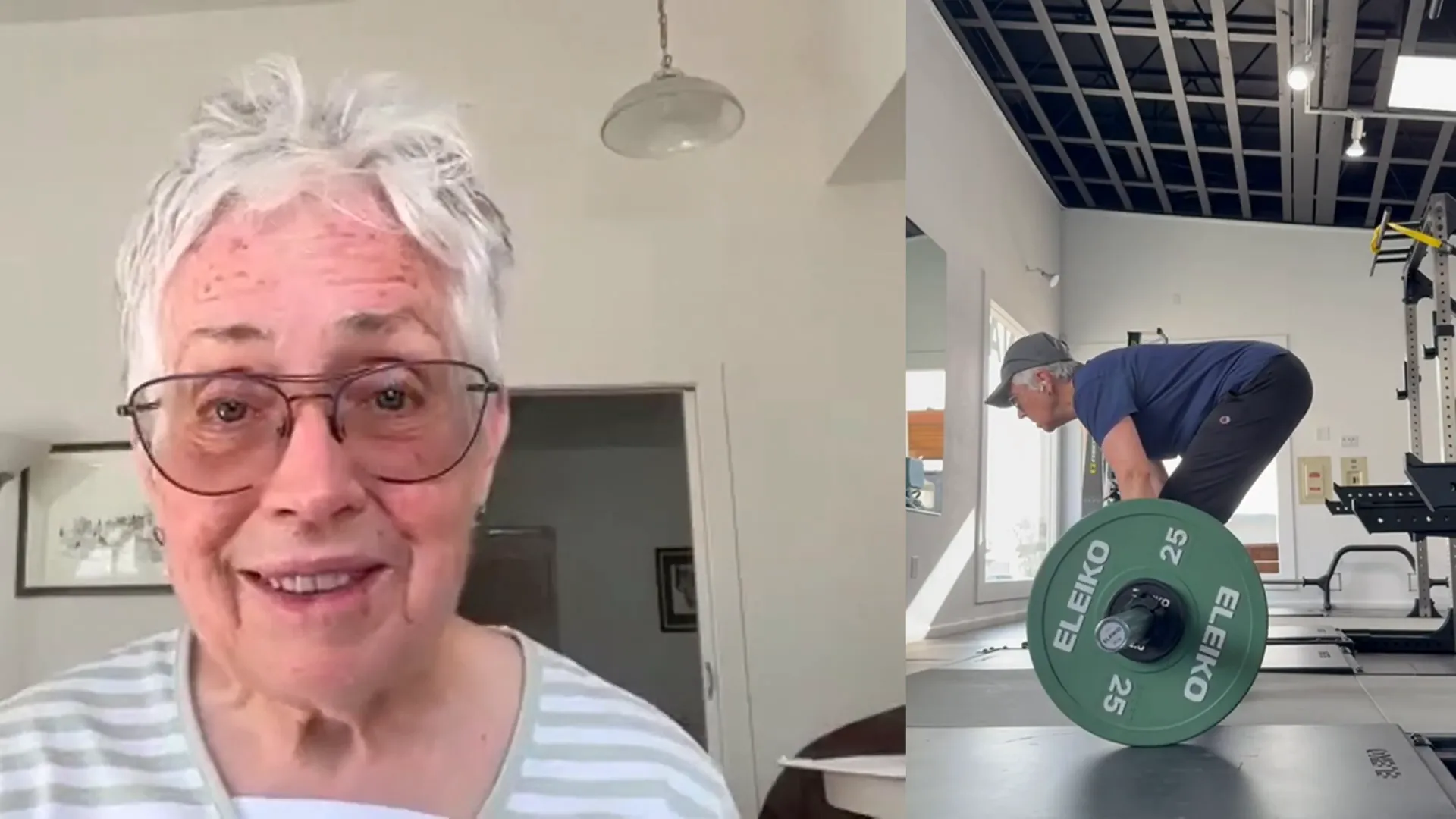
The Truth About Vegan Powerlifter Strength Training for Beginner Women Over 70
Поделиться
Congrats to my client Patricia Farrell for winning her weight class in the USA Powerlifting California Summer Open! Results:
Bench press: 35kg / 77 lb
Deadlift: 72.5 kg / 160 lb
The first competition is always the hardest, but we have already got the next one picked out :) Patricia has definitely gotten "the bug" of powerifting! The feeling of empowerment that comes with mastering squats, bench presses, and deadlifts is transformative. Not only did Patricia get stronger, but she also lost seven pounds and improved her overall fitness with no additional cardio.
The support Patricia received from her gym buddies at San Francisco gym "The Yard", family and the Dominican Sisters of San Rafael church she belongs to has made it a memorable and fun experience. The Dominican Sisters are the order of preachers who do hospital, social justice work and see their way as "preaching with their lives" - Patricia says. Throughout my training career I've noticed that people of faith train differently: Patricia maintained calm dedication and I didn't have to motivate her to keep progressing in the weight room.
 The story was on the news because sadly it is still unique to see older folks in the gym. As time goes on, and with women like Patricia crushing stereotypes we are going to see more and more women of all ages, vegans, nuns and folks of all walks of life in the weight room.
The story was on the news because sadly it is still unique to see older folks in the gym. As time goes on, and with women like Patricia crushing stereotypes we are going to see more and more women of all ages, vegans, nuns and folks of all walks of life in the weight room.
Why do so many people believe that lifting heavy weights is reserved for the young and healthy, celebrity-looking folks when strength training IS what makes you preserve youth and obtain long term health? Strong skeletal muscle doesn't just grow without stimulus.
Training for strength, skills and not the elisuve beauty standards or approval of others. We all have vanity, but the barbell doesn't care :) It takes stories like Patricia's to show what is possible (that has been there all along!). It takes role models to show vegans don't have to resort to walking and yoga.
Patricia highlights that her back has gotten stronger in her interview to ABC News. It's sad the journalists don't understand the difference between weight lifting (clean and jerk, not the same as lifting weights) and powerlifting (squat, bench, deadlift). Oh well! Glad they have highlighted Patricia has been a nun since 40, vegan for 12 years and is on no medications - yeah, at 72!
Strength training after 70 (well, and at any age, really) isn’t just about cool-looking muscle—it’s about health, longevity, and quality of life. IT'S NOT OPTIONAL, FOLKS! YOUR LIFE LITERALLY DEPENDS ON IT! Lifting weights helps build stronger bones, reduces the risk of falls, and keeps the body functioning at a high level. Patricia’s story is a testament to this truth, showing that it’s never too late to start lifting heavy and reaping the benefits.
From Home Gym to Powerlifting Gym: Evolving Your Training Environment
When Patricia first reached out to me, she sent pictures of her home workout equipment: bands, dumbbells, TRX, kettlebells, and even a barbell. Not many women her age have access to a barbell at home, which was a great starting point. She wanted to prepare for a powerlifting competition, lose a little weight, and get stronger—all from the comfort of her apartment.
However, it quickly became clear that Patricia was too strong for her initial home workout program. I began encouraging her to step out of her apartment and into a commercial gym with more equipment. She embraced the challenge and steadily progressed, but even that gym had limitations: no benches of competition height, lack of squat racks with safety arms and poorly labeled uncalibrated barbells. As she grew stronger, she outgrew the commercial gym within two months.
That’s when I pushed her to train at a dedicated powerlifting gym equipped with competition-sized benches and calibrated barbells exactly like the ones she'd have in the meet. And those people knew how to spot and do bench press bar hand-offs. This transition was crucial. Training in a powerlifting gym meant she could practice with the exact equipment she would encounter in her meet, preparing her both physically and mentally for competition. She's also found a supportive community of lifters who attended the same meet! Ideal situation for a newbie in the sport.
Your environment matters. As you progress, finding the right coach and the right gym with appropriate equipment and community support can make a ginormous difference. It’s about evolving your training approach and environment to match your growing capabilities and ambitions. Growth means change, and change cantake us out of the comfort zone. That's ok!

Balancing Strength Gains and Weight Loss on a Vegan Diet
One common concern among beginners, especially older women, is whether it’s possible to gain strength while losing weight, particularly on a vegan diet. Patricia’s results prove it’s entirely doable with the right approach. Over the course of her training, she lost seven pounds and increased her strength, which is no small feat.
She explains, “It’s been fairly simple. Even though it’s been a calorie deficit, it hasn’t been such a deep calorie deficit that I ever felt like I was not getting enough food or that I was hungry. I might be hungry on occasion in between meals or when coming home from the gym, but because we concentrated so much on protein, and I’m vegan with a lot of fiber in my diet, I’m not hungry.”
Protein intake is critical for vegan powerlifter strength training, beginner women included. Patricia consistently consumes about 140 grams of protein daily, which she manages through carefully planned vegan meals. This protein focus ensures muscle repair and growth, even while in a calorie deficit. It also keeps her feeling satiated and energized.
Her experience debunks the myth that vegans can’t build muscle effectively. With the right nutrition, strength training, and coaching, vegan athletes can thrive and gain strength while maintaining or losing weight.
Overcoming Challenges: The Importance of Coaching and Community
Starting strength training alone can be intimidating, especially for older women who might face skepticism or lack of support from family, friends, or even medical professionals. I've experienced a similar vibe lifting while pregnant... Patricia initially worried about attending a powerlifting meet alone, not knowing anyone. Yet, once she joined the powerlifting gym, she notes:
“Now I got this whole family of people that are going to the meet. We’ll be there together and cheer each other on, and I’m not going to be alone.” This sense of camaraderie helps overcome fears and boosts confidence.

Coaching also plays a critical role. Patricia had tried online coaching before but was dissatisfied because she didn’t feel like she was taken seriously enough with her strength goals: she got some bands and kettle bell workouts that didn't change her strength much. She needed clear answers, video feedback, and form corrections—especially since she was learning complex lifts like the deadlift and bench press with a barbell for the first time.
I insist all my clients send me videos of their lifts for detailed video feedback, personalized programming, and always make sure their "why"'s get answered timely. Through years of coaching I've learnt that what clients tell me and what what I see in their videos can be very different. This approach makes sure I know what to program next, and clients know they are safe and progressing at a rate that makes sense.
Having a coach who listens and pushes you appropriately can make all the difference. Patricia appreciates that I pushed her out of her comfort zone, from home workouts to a commercial gym and then to a powerlifting gym with competition equipment. I listened to her goals and helped her believe in her potential.
Comparing Risks and Benefits: Lifting Heavy Can be Safe at Any Age
When my mother was in her 40s she broke her nose while walking on a perfectly flat piece of pavement. She just tripped and didn't land well. The point is - any activity has risks and benefits, and of course its dose of luck and chance.
I am currently pregnant and often hear comments suggesting I should switch to yoga, walking, or swimming instead of lifting weights. Unsolicited advice to stop lifting and relax, despite lifting very low percentages of my one rep max never stop. Some people cannot fathom that training is fun and relaxing for me!
If you don't look like the average gym goer - are very short, young, old, pregnant, etc - chances to get criticism or odd comments checking whether you know what you're doing increase dramatically. I'm glad Patricia doesn't get such harrassment. in a small powerlifting gym. She told me the main reason is - people know she has an experienced coach :)

Patricia has suffered from lower back issues all her life but found that strength training has strengthened her back muscles, reducing lower back pain. She emphasizes the importance of proper form over ego lifting which helps her set reasonable expectations and encourages a sustainable approach to training.
She joined a Facebook group called “Weightlifting Over Seventy,” where the women are focused on lifting heavy rather than just striving for a sexy look or losing weight. Women cheer each other on, not being afraid to come as they are - diverse body types and levels of fitness, united by their love for lifting. Younger ladies have something to learn here... Age should never be a barrier to pursuing strength and health.

Understanding the Realities of Training: Pain, Fatigue, and Recovery
Training hard means experiencing some aches, pains, and fatigue, and that’s normal. Patricia recalls feeling a bit dizzy after some deadlift reps early on, which I reassured her was common and nothing to fear. I get that too after heavy deadlifts as a 30-something professional athlete woman. I help Patricia distinguish between feeling fatigued post workout and severe tightness / pain that needs to be addressed seriously. Thankfully we haven't had any issues, and I sure hope it'll stay that way!
FYI In the world of athletic training, many sensations are normal, including:
- Delayed onset muscle soreness (DOMS)
- Muscle tightness, especially in quads and back
- General fatigue post workout, or feeling low energy next day
Patricia mentions that after leaving the gym she usually feels energetic and strong, but by evening, she can feel completely spent. Interestingly, this fatigue is not just about age; my younger clients and gym friends experience it too. It’s more about the CNS fatigue your training volume and intensity brings. It’s about listening to your body, respecting its limits, and pushing safely toward new goals.

Why You Should Start Strength Training Today
Strength training is for everyone, especially older women who want to improve their health, strength, and confidence. And lose weight, of course - but notice how when the focus is shifted to performance - weight loss just becomes a nice "added bonus" instead of something one agonizes about.
Whether you’re a beginner or more experienced, the key ingredients are dedication, good coaching, and a supportive community. If you’re considering starting your own strength training journey, remember:
- Start with proper guidance and coaching to ensure safety and effectiveness.
- Focus on nutrition, especially protein, to support muscle growth and recovery.
- Find a community or support system to encourage and motivate you.
- Be patient and listen to your body as you progress.
- Embrace the challenge and enjoy the process of becoming stronger.
I’m here to help you get started and reach your goals. Strength has no age limit, and neither should your aspirations. To get started with personalized coaching, feel free to reach out. Let’s get you strong, healthy, and have fun along the way —no matter your age!
Ready to take your training to the next level, get stronger, improve your diet?
Select from a list of our signature 1:1 custom programs or self-guided courses
See Programs
